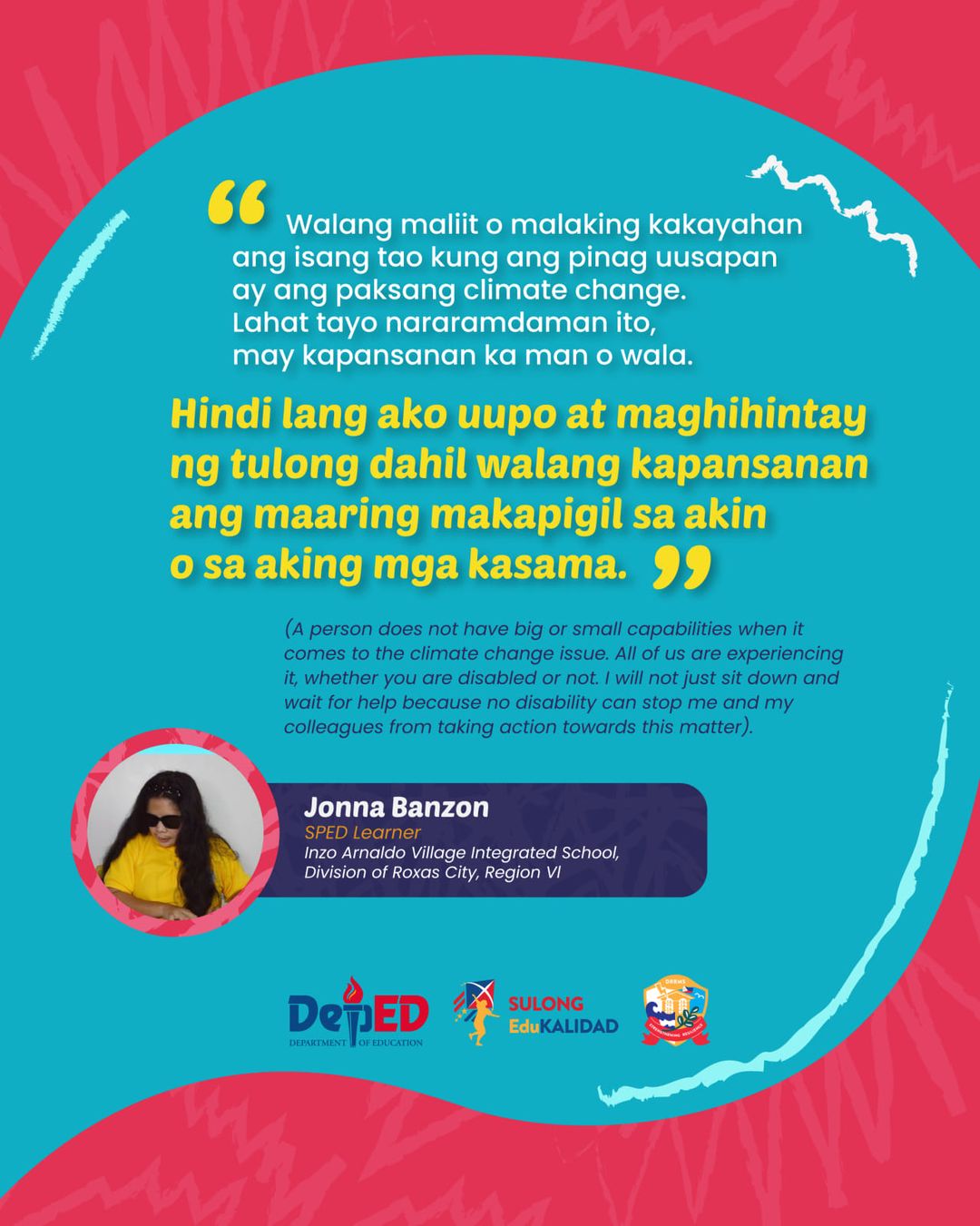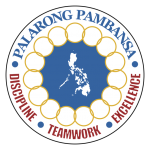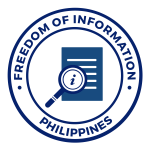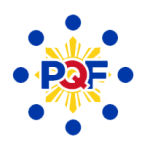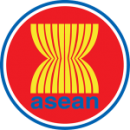The Need for Climate Change Education
Data from the Department of Education’s (DepEd) Enhanced Basic Education Information System (EBEIS) from school year (SY) 2009-2010 to SY 2017-2018 show that 43,810 of the almost 47,000 public schools in the country experienced natural hazards at least once in eight (8) years – where 39,738 schools had been affected by tropical cyclones; 25,191 had been inundated by floodwaters; and 5,824 had faced coastal area concerns. The impact of rising sea level and droughts in the education sector had not been accounted for. These data provide strong evidence that young people all over the country are experiencing the impacts of climate change and remains to be the one of the most vulnerable sectors to climate change. Moreover, intensified weather conditions such as typhoons and droughts, together with adverse environmental conditions impose a risk to young people’s physical, mental, social, and emotional development.[1] UNICEF reported that “climate change exacerbates the many threats to children’s wellbeing, survival and access to services in the Philippines, including education, water and sanitation, nutrition and health”. [2]
Currently, an upward trend of young people concerned about the effects of Climate Change can be observed as they are driven by the idea that their generation will witness the worst impacts of Climate Change. Their heightened concern is evident in the success of the school strikes for climate action that push for political and economic changes. Recently, The Youth Strike 4 Climate Philippines released the Youth Declaration for Climate Justice which involves divestment from coal and fossil fuel, just transition to a sustainable society, protection of vulnerable groups such as indigenous people, environment and human rights defense, and young people, and increased implementation of environmental education.[3]
The need for intensive climate education integrated into compulsory education is underscored in the United Nations Conference of Parties (COP), the highest decision-making body of the United Nations Framework Convention on Climate Change (UNFCCC) which first met in 1995 and seeks to reduce atmospheric concentrations of greenhouse gases, in Madrid, 2019. Countries such as Italy and Mexico committed to updating their curriculum in response to the demands of young people for climate education.[4] More countries were expected to make a commitment for climate and environmental education on 2020 Earth Day which also marked its 50th celebration. However, the response to the pandemic was prioritized and there were no updates to this call for action. In the Philippines, youth groups such as the Youth Strike for Climate Philippines and The Climate Reality Leaders Philippines – Youth Cluster includes strengthening climate change education in their demands for the government.
Climate Change Education in the Philippines
The Philippines had long responded to the call for climate change education pursuant to Republic Act No. 9729 or the Climate Change Act of 2009. The Enhanced Basic Education Act of 2013 or the K-12 Act strengthened curriculum integration of key climate change concepts across grade levels. DRRM and CCA concepts are integrated from kinder to junior high school subject areas such Health, Science, Araling Panlipunan, and Edukasyon sa Pagpapakatao. For senior high school, a special subject in DRRM is offered as part of the STEM strand. In addition, climate change competencies can be found in Earth Science and Earth and Life Science. The changes in the curriculum were complemented by co-curricular actives like the establishment of the Youth for Environment in Schools Organization (D.O. 93, s. 2011) and integration of Gulayan Sa Paaralan, Solid Waste Management and Tree Planting Under the National Greening Program (NGP) (D.O. 5, s. 2014). Also, the Department of Education (DepEd) had been supportive of the participation of learners in climate strikes through the issuances of OUA Memo 00-0920-0168, 12-1119-0504, and 12-019-0341 that raises awareness and enjoins school head to excuse the absence of learners who joined the climate strike provided parental/guardian consent is presented.
“Every time we raise our voice with regards to the climate crisis it is because you (teachers) have taught us well,” said Joshua Villalobos, Grade 12 student and one of the youth leaders behind Coal-Free Negros.[5]
The Department of Education through the Disaster Risk Reduction and Management Service (DRRMS) reaffirms its commitment to intensify climate literacy and support climate action in the basic education sector. DRRMS hopes to hone learners and personnel who are climate literate and pro-active in championing resilient and sustainable schools and communities. The talents and skills of learners are tapped through the use of co-curricular activities. Community partnership through a broader audience of IECs and involvement in academic tasks is valued to reinforce a holistic climate change education. Lastly, the efforts in curriculum integration will be supported by institutional policies and practices highlighting sustainable consumption and climate-resilient measures.
Through its Climate Change Adaptation and Mitigation, DepEd hopes to continue honing young people like Villalobos who are aware of climate change challenges and act for the climate.
[1] UNICEF Innocenti Research Centre. (2008, November). Climate Change and Children: A Human Security Challenge. UNICEF
[2] Ortega, J. and Klauth, C.(2017, July). Climate Landscape Analysis for Children in the Philippines. UNICEF Philippines.
[3] Youth Strike 4 Climate Philippines (2020), Youth Declaration for Climate Justice.
[4] Evans, S. and Gabbatiss, J. (2019, December 15). COP25: Key outcomes agreed at the UN climate talks in Madrid. Carbon Brief. Retrieved from https://www.carbonbrief.org/
[5] Villalobos, Joshua. “Role of Youth in Climate Action,” inspirational address at DepEd’s 3rd National Climate Change Conference, November 19, 2019.
PROJECTS ON CLIMATE CHANGE EDUCATION
The projects listed are led and implemented by various DepEd offices including the Disaster Risk Reduction and Management Service (DRRMS), Bureau of Learner Support Services (BLSS) – Youth Formation Division (YFD), School Health Division (SHD), Bureau of Curriculum Development (BCD), Public Affairs Service (PAS), and Information and Communications Technology Service (ICTS).
Updated – June 2021
Policies
- DO 44, s. 2018 - Formation of the DepEd DRRM Team in the Central Office
- DO 10, s. 2016 - Policy and Guidelines for the Comprehensive Water, Sanitation, and Hygiene in Schools (WinS) Program
- DepEd Order No. 10 s. 2016
- DO 5, s. 2014 - Implementing Guidelines on the Integration of Gulayan sa Paaralan, Solid Waste Management, and Tree Planting Under the National Greening Program
- DO 93, s. 2011 - Mandated Programs, Projects, and Activities, Various Forms, and Targets Pertinent to the Youth for Environment in Schools Program
- DO 33, s. 2008 - Responding to the Threats of Climate Change and Global Warming Through Massive, Intensive, and Sustained Tree-planting, Tree-growing, and Tree-caring Program
- DO 72, s. 2003 - Establishment of the Youth for Environment in Schools (YES) Organization
- DO 65 s. 2017 - Guidelines on the Conduct of Post Disaster Needs Assessment (PDNA) in the Education Sector
- DO 28 s. 2016 - Strengthening the Fire Safety and Awareness Program
- DO 37 s. 2015 - The Comprehensive DRRM in Basic Education Framework
- DO 23 s. 2015 - Student-led School Watching and Hazard Mapping
- DO 21 s. 2015 - DRRM Coordination and Information Management Protocol
- DO 43 s. 2012 - Guidelines on the Implementation of EO 66 (Suspension of Classes)
- DO 83 s. 2011 - Disaster Preparedness Measures in Schools
- DO 50 s. 2011 - Creation of Disaster Risk Reduction and Management Office (DRRMO)
- DO 82 s. 2010 - Reiteration of Related Implementing Guidelines on CCA-DRR
- Released Office of the Undersecretary Memos 12-1119-0504 and 12-019-0341 for 2019 Climate Strike and OUA Memo 00-0420-0059 for 2020 Digital Earth Day Strike
- Encouraged personnel and learners to engage in climate action
- Enjoined teachers and school heads to excuse the absence of learners who joined the climate strike provided parent/guardian’s letter is presented
Curriculum Integration
In February 2020, the Disaster Risk Reduction and Management Service (DRRMS) convened specialists from the Bureau of Curriculum Development (BCD), Bureau of Learning Delivery (BLD), and Bureau of Learning Resources (BLR) to strengthen the integration of Disaster Risk Reduction and Management, Climate Change, and Peace Education in the K-12 Curriculum. The workshop produced a set of core messages highlighting the interdependencies of the three concepts. It is anchored on Global Citizenship Education (GCED) and Education for Sustainable Development (ESD).
In July 2021, DRRMS revisited the key messages to mainstream learner's rights and engagement in the key messages.
The draft climate change in education key messages are as follows:
OVERARCHING FOR CLIMATE CHANGE EDUCATION, DISASTER RISK REDUCTION, AND PEACE EDUCATION
- Learners have an evolving capacity to participate in making informed decisions and in leading actions to address issues relating to disasters, climate change, and peace.
- Learner's rights are respected, protected, and fulfilled at all times, even during disasters and emergencies.
- Respecting the dignity and interconnectedness of all life forms is a foundation for peace.
- Disasters, climate change, and emergencies worsen the condition of marginalized communities and sectors.
PEACE EDUCATION AND CLIMATE CHANGE EDUCATION
-
Stewardship of the earth is a shared responsibility of all towards lasting peace and development.
CLIMATE CHANGE EDUCATION AND DRR IN EDUCATION
-
Climate change intensifies natural and human-induced hazards.
CLIMATE CHANGE EDUCATION
-
Climate change, while also caused by natural activities, is primarily being driven by anthropogenic activities.
-
Failure of the ecosystem to adapt to climate change threatens its ecosystem services and all living things that depend on it.
-
Human activities have unintended impact to the environment, which affects life.
-
The Earth's natural resources are finite, thus need to be used conscientiously.
-
Bayanihan (community self-help), maingat at matalinong paghuhusga (prudence), and malasakit (concern for others) help bridge climate literacy to climate action.
-
Addressing climate change through adaptation and mitigation is everyone’s responsibility.
Should you have suggestions or comments, please don't hesitate to e-mail us at drrmo+ccam@deped.gov.ph.
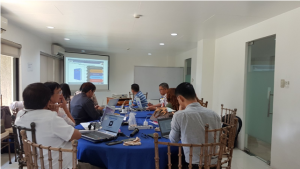
The following knowledge materials are being developed and will be uploaded at the DepEd Commons and LRMDS once available:
- The KaLikHasan! Likha at Lakas ng Kabataan para sa Kalikasan: A Creative Sourcebook on the Use of Theater for Climate Education and Action was developed following the success of the 2019 Climate Action Advocacy Show co-created and performed by 72 students from the Divisions of Malabon City, Navotas City, and Pasig City.
- Acknowledging the Philippines as a center for biodiversity and adversity specially on the interconnectedness of biodiversity and climate change, the Samo't Saring Buhay: A Toolkit on Philippine Biodiversity will provide information on these particular topics and generate a species fact sheet at the national and regional level.
- The Questions on Climate Change Answered: Handbook on Teaching Climate Change shall provide information on the different aspects of the climate crisis particularly climate science, impacts of climate change, and adaptation and mitigation strategies. The discussion is driven by the most frequently asked questions by students and the most challenging questions encountered by the teachers.
Co-curricular Activities
- Gathered around 900 stakeholders (DepEd personnel, students, climate change specialists and activists, NGAs, LGUs)
- Reviewed more than 300 applications nationwide
- Provided a platform for 25 learners for their climate change projects
- Engaged five major partners (OMLC, Save the Children, WVDF, Plan International, and PDRF) and eighteen minor partners (speakers)
- Read more here.
- Conducted online with Filipino Sign Language Interpretation
- Gathered 3, 513 attendees coming from 162 of 223 divisions and all 18 regions according to the evaluation form and 275, 850 total number of unique views
- Produced 17 hours and 21 minutes of contents through the seven learning sessions
- Engaged 45 learners in different roles such as speakers, panelists, hosts, reactors, press team writers, and online quiz show contestants
- Partnered with the Climate Change Commission (CCC), Association of Young Environmental Journalists (AYEJ), Cultural Center of the Philippines (CCP), Save Philippine Seas (SPS), Save the Children Philippines, and Filipino Sign Language (FSL) Interpreters
- Read more here.
- Watch Opening Ceremony, Streaming of Climate Action Advocacy Show, Battle of the Brain Corals, Climate Science Master Class, Closing Ceremony.
- Provided platform for 72 learners to present their voices and visions on climate change in front of 600 education stakeholders for the first live performance in 2019 during the 3rd NCCC. Read more here.
- Livestreamed the 2019 Climate Action Advocacy Show during the 4th NCCC. Read more here. Watch here.
- Developed the KaLikHasan! Likha at Lakas ng Kabataan para sa Kalikasan: A Creative Sourcebook on the Use of Theater for Climate Education and Action for teachers and educators to replicate the process of the show and co-create theater performances with their learners
- Trained 40 learners and 12 advisers in the pilot onlinee training based on the KaLIKHAsan Creative Sourcebook in the divisions of Bulacan, Roxas City, and Koronadal City in partnership with Komunidad X and Save the Children Philippines [on-going]
- Trained 40 Campus Journalists and 40 School Paper Advisers in selected divisions of the Manila Bay Rehabilitation Program for Phase 1 - News and Feature Writing. Read more here
- Published 40 environmental stories
- Trained 140 Campus Journalists and 20 School Paper Advisers in selected divisions of the Manila Bay Rehabilitation Program for Phase 2 - Radio Broadcasting with World Vision Development Foundation as a partner [on-going]
- Trained 60 adolescents aged 10-18 years old from the divisions of Valenzuela City, Albay, Western Samar, and Dipolog City where 10 projects were selected for implementation
Activities
- Capacity Building of YES-O student-officers and teacher-advisers for Environment Protection and Sustainability (Webinar Series) - This capacity building will focus on the mandated Programs, Projects and Activities (PPAs) of the Youth in Environment in Schools Organization (YES-O) that will guide them in the implementation within their schools.
- Capacity Building of Youth Formation Coordinators in Climate Resiliency and Youth Engagement (Webinar Series) - This capacity building will focus on the strategies in rallying active participation of learners in "Maka-kalikasan" Programs, Projects, and Activities (PPAs).
- YES-O Regional Coordinators Meeting - This is a year-end review for 2021 and planning for 2022 for YES-O PPAs
- Development of Manual for YES-O-This is to guide the YES-O student officers and teacher-advisers in running the organization and implementing the mandated PPAs.
- Program Support Fund for Schools for the Implementation of Gulayan sa Paaralan-A support fund for the schools in the 4th-6th class municipalities especially those schools with Zero or Minimal established Gulayan.
- Earth Day Celebration - Earth Day celebration aims to (i) provide a platform for learners to showcase their commitment to Earth restoration, (ii) strengthen the “Maka-Kalikasan” core value among learners, (iii) rally more learners and personnel to be engaged to environmental actions, and (iv) promote environment protection among DepEd stakeholders. Read more here.
IEC and Advocacy
RAINFALL PREPAREDNESS
A "Go Bag" is an emergency-preparedness bag that you pack in advance, but hope you never need. These bags are useful in situations that require a hasty evacuation. Your emergency kit should be self-contained in one small or medium-sized bag and should contain enough nonperishable food and potable water for you and your family to last several days.
Do not forget to secure face masks, face shields, hand sanitizers, and alcohols in our Go Bags.
EARTHQUAKE PREPAREDNESS
When the earth starts to shake, your actions could directly result in survival or serious injury. It is imperative you learn what to do during an earthquake if you are at home, work, school or on the road.
Partnerships
- Formalized partnership with the Climate Change Commission in 2019 through a signed Memorandum of Agreement
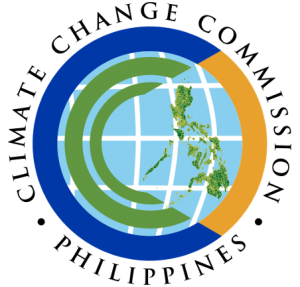
- Association of Young Environmental Journalists (AYEJ)
- Biodiversity Conservation Society of the Philippines (BCSP)
- Climate Change Commission
- Climate Action for Sustainability Initiative (KASALI)
- Cultural Center of the Philippines (CCP)
- Department of Environment and Natural Resources (DENR)
- Climate Change Service (CCS)
- Biodiversity Management Bureau (BMB)
- Oscar M. Lopez Center for Climate Change Adaptation and Disaster Risk Management Foundation, Inc.
- Philippine Disaster Resilience Foundation (PDRF)
- Plan International
- Save Philippine Seas (SPS)
- Save the Children Philippines
- UNICEF Philippines
- World Vision Philippines
Plans for 2021-2022
- Review and development of policies to strengthen climate change adaptation and mitigation in schools and offices
- Research on the Adaptation Strategies of Schools Experiencing SLR and Extreme Flooding
- Review, development, and enhancement of DepEd-Developed Learning Resources for K-12, Alternative Learning System, and Learners with Disabilities
- Development and conduct of training on key climate change concepts for DepEd Personnel
- Continuation of projects integrating CCAM in the co-curricular activities
- Development of IEC materials for publication in different forms of media
- Conduct of Regional Climate Change Caravan
For partnerships, please don’t hesitate to e-mail us at drrmo+ccam@deped.gov.ph.



































